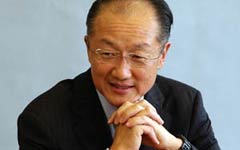The BRICS countries, Brazil, Russia, India, China and South Africa, are expected to pursue a development bank during a summit in Brazil next week. This is in addition to the idea of an Asian Infrastructure Investment Bank that is being mooted by countries in the region.
World Bank President Jim Yong Kim, who visited China this week, welcomed the initiatives for the two new multilateral lending institutions. He said on Tuesday they would not be a threat to his institution but instead help it fight poverty and spur economic growth.
Kim has emphasized repeatedly since taking office two years ago that fighting poverty is a top priority for the World Bank, but additional capacity will make the global cause all the more effective. Emerging countries, such as China, which has lifted hundreds of millions of people out of poverty in the past decades but still faces huge challenge in this area, know just how much remains to be done in this area.
However, US State Department's response seems to be quite ambivalent. Spokeswoman Jen Psaki, while acknowledging the need for additional development to support infrastructure projects, said on Tuesday, the new institution should clearly incorporate high standards of governance, environmental and social safeguards, procurement, and debt sustainability that have been established over decades of experience at multilateral development banks.
|
 |
 |
It is true that the proposed BRICS bank could be interpreted to some extent as a reflection of frustration by emerging countries that they are not equally represented in international financial institutions. Throughout the decades, there has been an American at the head of the World Bank and a European at the head of the International Monetary Fund.
In this regard, the new institutions are sending a signal from the rising rest to the United States with its global dominance that things need to change and evolve to adapt to the new reality. But they are also meant to improve the current global system to make it better and fairer, not to overturn it.
Kim should be commended when he refuted the concerns that the proposed new institutions will compete with the existing multilateral lenders by saying that "our competition is poverty. Our enemy is lack of economic growth. Another enemy is growth that is not inclusive".
Indeed, if there is competition, it is friendly competition to address these common global challenges.
Despite the positive role the US has played in many areas over the years, its superpower dominance has many inherent flaws.
For one, as I went on Tuesday to the Cuban Interests Section in Washington to get my press visa, I was told to pay only in cash because since February this year, no US-based banks will handle the accounts for the Cuban diplomatic missions based in the US, under the draconian US embargo against Cuba.
The ridiculous US sanctions on the Caribbean nation since 1960 have inflicted enormous damage on the island's economy and brought suffering to its people. Just last October, the United Nations General Assembly adopted a resolution for the 22nd consecutive year, calling for an end to the economic, commercial and financial blockade imposed by the US. The vote was passed with 188 in favor, three abstentions and two against, the US and Israel.
The US likes to talk about freedom of trade and navigation all the time, yet here is a gross violation of that by the world's sole superpower.
So if democracy is what the US preaches, the new multilateral lending institutions will not only help developing nations in their fight against poverty and for economic growth, it will also help democratize the global governance system that has been dominated by the US for far too long.
The author, based in Washington, is deputy editor of China Daily USA.
